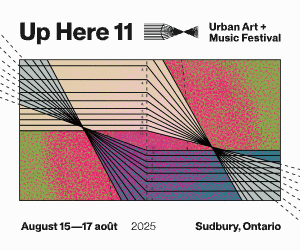K-Riz is Happier Than Ever
Taking inspiration from the King of Pop himself, the Edmonton rapper bounces back after a series of bad breaks.
By Daniel McIntosh
Photo by YamaGucci
- Published on
He showcased his experiences on The Room and Peace & Love, both showcasing his ability to stretch tightly-wound narratives over beats that draw the mind back to the bombastic, soul-rooted sound that defined rap’s early presence. On his latest record, One Way Ticket, K-Riz’s honest lyrics are buoyed by a newfound sense of joy and lightness. Bright, symphonic tones are supplied by a wide cast of producers from across the country, laced with horns and embellishments that express the expansion of his sound.
K-Riz likens this album, and his experience making it, to Michael Jackson’s Off the Wall. Famously Jackson’s first album as a solo player, it was invigorated by disco, pop, and funk, diverting from his brothers, his father, and the staid Jackson 5 sound people had come to know. What’s more: he was full of potential, far from the chaos and demise that defined his later life. He was “pure” in that era, as K-Riz puts it.
“He wanted to express what was in him, you know what I mean? And a lot of that album was just pure joy,” he says. “‘Rock with You,’ ‘Girlfriend,’ ‘Don’t Stop ‘Til You Get Enough.’ That was pure joy. And I feel like [One Way Ticket] is the same thing.”
One Way Ticket is created through a similar lens of finding a new sense of buoyancy and lightness, a feeling K-Riz says he’s trying to recapture. “I feel that musically I just wanted to have fun,” he says. “And I wanted to get back to the joy of creating this music, even if it doesn’t make sense to anyone else. I’m just having fun, that’s what I relate to.”
While Jackson’s energy might have found its way into the project, One Way Ticket is also packaged like a joyful recollection of the rest of the last forty years of R&B. Produced over eight months, during which K-Riz says he was on a self-imposed lockdown, the sessions decimated his social life, only leaving the house to record and do live gigs. It’s a portrait of an artist in the midst of reorienting his own life, after Peace & Love probed the emotional turmoil of relationship breakdown and The Room documented his infirmity after a traumatic car accident. Understandably, K-Riz says neither of these albums were as fun to make or release. “I feel like this one is just more uplifting,” he says. “I’m in a way better place actually being able to see who I am artistically. Post-accident, I’ve learned about myself and know what I’ve learned musically. There’s newfound confidence.”


The sound seems equally drawn from the luxurious production of the Neptunes and Usher and the lyrical prowess of Lupe Fiasco. “Don’t Judge,” a standout song produced by KazMega, turns the drum track into a call and response. As K-Riz delves into the fallout of chasing dreams, the drums transition from a dynamic drum loop into a hailfire of stuttering cymbals, and as the verse escalates, so too does the cacophony and the anxiety. The maximal, big band style carries throughout the entire album, with vigorous, piercing horn arrangements—courtesy of Octavio N. Santos—punctuating the already bright production. It’s sure to be a treat to see live. The in-person arrangement is bolstered by his backing band in live performance, where they appear collectively as K-Riz & the Family.
One Way Ticket is the sound of K-Riz moving forward, and he describes it as the ultimate version of who he wants to be musically and as a person. The production—benefitting from its anachronistic use of scratching, horn arrangements, and samples—relies on a wide net of producers, who he selects according to their skills.
He taps producers based on their unique relationships to him: one producer “knows what I like, he knows how I like to sound.” Another gets “complete freedom to add what he wants.” Some he’s known since they were teenagers. “They definitely bring out different parts of me, you’ll hear different parts of me on this album,” he says. It allows K-Riz to venture further into the range of serious raps and R&B that he laid out on previous albums, with dynamic changes and freedom given to a camp of talented musicians.
“I don’t consider myself a leader. I’m a pretty humble guy,” he says. “But I hope that if I’m a leader, that I lead by example, and people strive to make the best music they can and be the best versions of themselves that they can. I believe that it’s possible. And once you believe that it’s possible you start acting accordingly.”
Eddie Pe$os, who produced two songs on One Way Ticket, says that K-Riz’s ability comes from an instinctive genuineness that crosses genre boundaries. “I met him in 2015 at the platform 10 at 10. From then until today, he has remained consistent and true to his sound. In Calgary, he’s only amplified his presence and connection.”
In spite of rejecting the leadership title suggested for him, K-Riz has no worries about the future of music in Alberta. After all, he watched as Toronto grew from a flyover city caught between New York and Los Angeles into a veritable hotbed for musical talent. Even now, he celebrates artists like Calgary’s Cartel Madras as veritable torchbearers for the province. “I want to represent the region, the province of Alberta,” he says. “And what does it look like for me? Hopefully through me and through others, there’s more eyes on this region and on this area because there’s more talent. There’s so much talent.”
By Leslie Ken Chu
The rock stalwarts lean into vulnerability and nuance, proving that evolution doesn’t have to mean softening the blow.
By Cam Delisle
The pop veteran beamed into Rogers Arena Tuesday night with a glitchy arsenal of remixed hits—some faring better than others in her AI-styled end-of-the-world fantasia.













